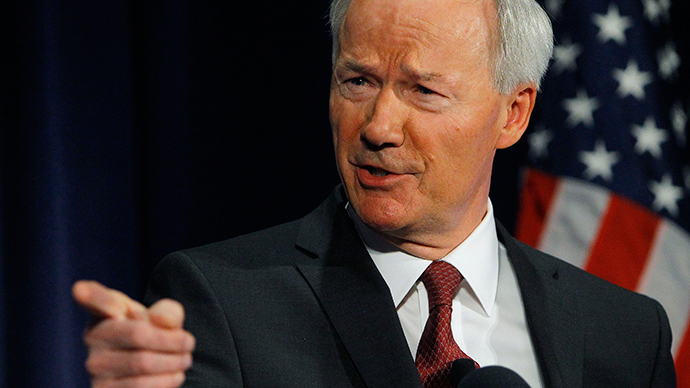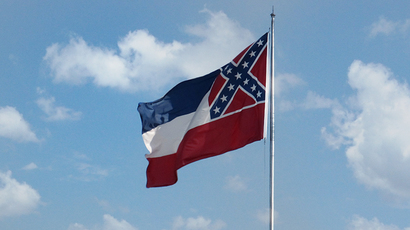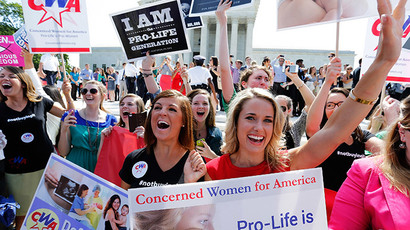‘Arkansas wants to be a place of tolerance’: Governor refuses to sign religious freedom bill

In a sudden U-turn, Arkansas’ governor didn't sign the Religious Freedom Restoration Act (RFRA) bill, saying it doesn’t mirror the federal bill closely enough. He previously supported the controversial legislation that caused public backlash.
“This is a bill that in ordinary times would not be controversial, but these are not ordinary times,” Governor Asa Hutchinson (R-Arkansas) said, announcing he would veto the Arkansas legislation if no changes are made to the bill as it is written, despite previous statements to the contrary.
Hutchinson’s announcement on Wednesday brings comes after Walmart ‒ which has its corporate headquarters in Arkansas ‒ LGBT rights groups and his own son called on him not to sign the bill.
“My son Seth signed the petition asking me, Dad the governor, to veto this bill,” Hutchinson told reporters, citing a generational gap in support for the religious objection law.
Walmart CEO on Arkansas' #ReligiousFreedom law: "We are asking Gov. Hutchinson to veto this legislation" pic.twitter.com/d2KAvksj9u
— OutFrontCNN (@OutFrontCNN) March 31, 2015
Hutchinson noted the federal RFRA law ‒ introduced by Democrats, passed by Congress and signed by then-President Bill Clinton in 1993 ‒ does not cover state actions to protect religious freedom, which is why he has said he supports the creation of such a law in Arkansas
“This bill is not really complicated. The bill itself restates the standard of review for the courts to consider in determining First Amendment privileges as weighed against the compelling interests of the state,” he said.
“It’s a balancing test. the bill itself does not pick winners and losers. it balances two competing constitutional obligations that our Founding Fathers gave to us,” he continued. “But the issue has become divisive because our nation remains split on how to balance the diversity of our culture with the traditions and firmly held religious convictions.”
READ MORE: Indiana gov. backtracks, seeks to clarify anti-gay law amid national backlash
The federal law mandates strict scrutiny be used when determining whether the First Amendment’s Free Exercise Clause ‒ guaranteeing religious freedom ‒ has been violated. Its passage was spurred by job discrimination against Native Americans who consumed peyote in religious ceremonies. In 1997, however, the Supreme Court ruled that the federal RFRA only applies to actions of the federal government, leading states to pass their own versions.
Currently 20 states ‒ including Indiana’s recently signed version ‒ have a RFRA, and 11 additional states apply a heightened standard for court reviews of government actions regarding religion. The Arkansas bill is nearly identical to Indiana’s. The Republican governor there, Mike Pence, has argued that the law is identical to the federal RFRA.
The Atlantic’s Garrett Epps argues there are two substantial differences between the Indiana law ‒ and, thus, the Arkansas bill ‒ and the federal version.
“First, the Indiana law explicitly allows any for-profit business to assert a right to ‘the free exercise of religion’," language the federal RFRA does not contain, Epps wrote. South Carolina is the only other state that permits that provision, while Louisiana and Pennsylvania explicitly exclude for-profit businesses from RFRA protections.
In what Epps calls “odd language,” he notes Indiana also doesn’t require the state or any other governmental entity to be a party to the legal proceedings in which a person claims that his exercise of religion has been, or is likely to be, substantially burdened. Only the Texas RFRA contains similar language.
Here's Governor Hutchinson's Complete Statement on #HB1228. We'll discuss today 2-6P on @newsradio1029! http://t.co/zAmqCn1fiz
— Doc Washburn (@DocWashburn) April 1, 2015
“The bill that is on my desk at the present time does not precisely mirror the federal law,” Hutchinson said, asking the legislature to make changes to the bill.
If state lawmakers don’t amend the bill or send new legislation with the changes he wants, Hutchinson said he may issue an executive order to include protections against discrimination.
“It is important to recognize that the bill as it is currently drafted does not change who we are and it does not change the current protections against discrimination. This bill simply defines the standard to determine the right balance,” Hutchinson said.
“Arkansas wants to be a place of tolerance, we want to be a place that has the right balance between religious protections and religious freedom and nondiscrimination,” he added.
I am committed to signing a RFRA law, and I have asked the legislature for it to mirror Federal law.
— Gov. Asa Hutchinson (@AsaHutchinson) April 1, 2015
He also called on the state’s attorney general to add a measure to the ballot that would extend civil rights protections to additional classes of citizens. Currently, Arkansas does not include sexual orientation or gender identity as a protected class against discrimination.
In March, it became law in Arkansas that cities and counties cannot pass ordinances protecting members of the LGBT community from discrimination. However, Hutchinson never signed the bill ‒ but he didn’t veto it, either.














